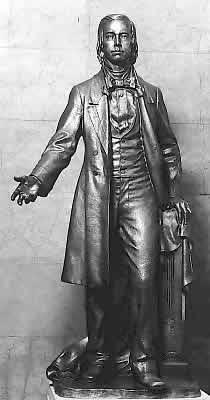Thomas Starr King


Thomas Starr King, (December 17, 1824 – March 4, 1864) was a Unitarian minister, influential in California politics during the American Civil War.
Thomas Starr King, "the orator who saved the nation", was born December 17, 1824, in New York City. The sole support of his family at age 15, he was forced to leave school. Inspired by men like Ralph Waldo Emerson and Henry Ward Beecher, King embarked on a program of self-study for the ministry. At the age of 20 he took over his father's former pulpit at the First Unitarian Church of Charlestown, Massachusetts.
In 1848 he was appointed pastor of the Hollis Street Unitarian Church in Boston, where he became one of the most famous preachers in New England. He vacationed in the White Mountains of New Hampshire and in 1859 published a book about the area entitled The White Hills; their Legends, Landscapes, & Poetry. In 1860 he accepted a call from the First Unitarian Church of San Francisco, California. During the Civil War, he spoke zealously in favor of the Union and was credited by Abraham Lincoln with saving California from becoming a separate republic. In addition, he organized the Pacific Branch of the United States Sanitary Commission, which cared for wounded soldiers and was the predecessor to the American Red Cross.
A fiery orator, he raised over $1.5 million for the Sanitary Commission headquarters in New York, one-fifth of the total contributions from all the states in the Union. The relentless lecture circuit exhausted him, and he died in San Francisco on March 4, 1864, of diphtheria.
Mountain peaks in the White Mountains (Mount Starr King, elevation 1,191 m (3,907 feet) and in Yosemite National Park are named in his honor. In 1913 he was voted one of California's two greatest heroes and funds were appropriated for a statue. In 1931 the state of California donated a bronze statue of King to the National Statuary Hall Collection. In 1941 the Starr King School for the Ministry (Unitarian Universalist), in Berkeley, California, was also renamed in his honor. King's church and tomb in San Francisco are designated historical monuments, and two streets in the city (Starr King Way, on which the church is located, and King Street in the Mission Bay neighborhood) are named for him. There is also a statue of him in Golden Gate Park, facing JFK Drive, quite close to the De Young Museum.
Statue replacement
On August 31, 2006, the California Legislature approved a joint resolution to replace Thomas Starr King's statue in the National Statuary Hall Collection with a statue of Ronald Reagan. The resolution was authored by State Senator Dennis Hollingsworth, and only Senator Debra Bowen voted against it. The vote came up at the end of the day when everyone was ready to conclude the session. As Senator Bowen said, “I truly had 40 seconds to get my thoughts together on this. I was trying to explain who Thomas Starr King was, but there just wasn’t time. With more time and some actual discussion the outcome might have been different. I was really offended by the way it happened. It was so politicized.”
In regard to his reason for removing the statue, Hollingsworth told the San Francisco Chronicle, "To be honest with you, I wasn’t sure who Thomas Starr King was, and I think there’s probably a lot of Californians like me.” He also went on to say that King was not a native of the state, which is true. It shoud be noted, however, that Junipero Serra, honored by California's other statue in the hall, was in fact born in Majorca, and Ronald Reagan was born in Illinois.
External links
- Thomas Starr King article from the Dictionary of Unitarian and Universalist Biography
- Thomas Starr King statue in the National Statuary Hall, U.S. Capitol, Washington, D.C.
- Thomas Starr King Middle School of Los Angeles, California
- United States Sanitary Commission (historical website)
- A Vacation Among the Sierras: Yosemite in 1860 (1962) by Thomas Starr King
- The White Hills; their Legends, Landscapes, & Poetry (1864) by Thomas Starr King
- First Unitarian Universalist Society of San Francisco: Our History
- SF Landmark: Sarcophagus of Thomas Starr King at Franklin Street and Starr King Way
- Sermon on Thomas Starr King, delivered 1-21-07 (.pdf format) by a Unitarian Universalist Reverend, Rod Richards
